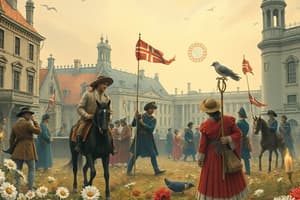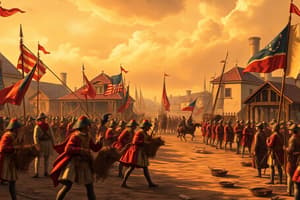Podcast
Questions and Answers
The US was founded as an independent country through a ______.
The US was founded as an independent country through a ______.
revolution
Before independence, the East Coast of the US was made up of British ______.
Before independence, the East Coast of the US was made up of British ______.
colonies
The thirteen colonies in North America were ruled by ______ assigned by Britain.
The thirteen colonies in North America were ruled by ______ assigned by Britain.
governors
Laws passed by the colonial assemblies had to be approved by the British ______.
Laws passed by the colonial assemblies had to be approved by the British ______.
The governors had the power to ______ bills passed by the assemblies.
The governors had the power to ______ bills passed by the assemblies.
In the mid-18th century, Britain and France fought the ______ for the scramble for colonies.
In the mid-18th century, Britain and France fought the ______ for the scramble for colonies.
To protect British interests, Britain drew up economic policies unfavorable to colonies' ______.
To protect British interests, Britain drew up economic policies unfavorable to colonies' ______.
The colonies could only export local products, such as tobacco, sugar, and cotton, to ______.
The colonies could only export local products, such as tobacco, sugar, and cotton, to ______.
After the Seven Years' War, Britain imposed ______ on North American colonies to cover expenditures.
After the Seven Years' War, Britain imposed ______ on North American colonies to cover expenditures.
The colonists claimed 'no taxation without ______', as they did not have representatives in the British Parliament.
The colonists claimed 'no taxation without ______', as they did not have representatives in the British Parliament.
People migrated from Britain and other European countries to North America to get away from religious and political ______ in the Old World.
People migrated from Britain and other European countries to North America to get away from religious and political ______ in the Old World.
[Blank] led to the outbreak of the Eighty Years War.
[Blank] led to the outbreak of the Eighty Years War.
The British ______ became the target of criticism.
The British ______ became the target of criticism.
After the Glorious Revolution, the Parliament passed the ______ in 1689 and established the new constitutional monarchy.
After the Glorious Revolution, the Parliament passed the ______ in 1689 and established the new constitutional monarchy.
In the 18th century, ideas of British and French ______ thinkers spread to North America.
In the 18th century, ideas of British and French ______ thinkers spread to North America.
The British government gave the British East India Company the right to sell tea to the colonies ______.
The British government gave the British East India Company the right to sell tea to the colonies ______.
People in Boston poured 300 boxes of tea into the sea and this was known as the ______.
People in Boston poured 300 boxes of tea into the sea and this was known as the ______.
Representatives of the colonies met in Philadelphia with the Britain to abolish the unreasonable ______.
Representatives of the colonies met in Philadelphia with the Britain to abolish the unreasonable ______.
George ______ was appointed the commander-in-chief of the Continental Army.
George ______ was appointed the commander-in-chief of the Continental Army.
The US federal government assigns the legislative, executive and judicial powers to three separate branches: the Senate, the House of Representatives, and the ______.
The US federal government assigns the legislative, executive and judicial powers to three separate branches: the Senate, the House of Representatives, and the ______.
Flashcards
British Colonial Rule
British Colonial Rule
The thirteen colonies in the East Coast of North America were ruled by governors assigned by Britain. Colonies had assemblies and right to elect representatives.
Heavy Taxation
Heavy Taxation
After the Seven Years' War Britain imposed heavy taxation on North America to cover war expenditures. Tax items included the Sugar Act, Stamp Act, and Townshend Acts.
No Taxation Without Representation
No Taxation Without Representation
The North Americans believed Britain should not tax them and claimed 'no taxation without representation'. Because they did not have representatives in the British Parliament.
Pursuit of Liberty
Pursuit of Liberty
Signup and view all the flashcards
Dutch War of Independence
Dutch War of Independence
Signup and view all the flashcards
British Civil War
British Civil War
Signup and view all the flashcards
Glorious Revolution
Glorious Revolution
Signup and view all the flashcards
The Enlightenment
The Enlightenment
Signup and view all the flashcards
Boston Massacre
Boston Massacre
Signup and view all the flashcards
Boston Tea Party
Boston Tea Party
Signup and view all the flashcards
First Continental Congress
First Continental Congress
Signup and view all the flashcards
Battle of Lexington
Battle of Lexington
Signup and view all the flashcards
Second Continental Congress
Second Continental Congress
Signup and view all the flashcards
Declaration of Independence in 1776
Declaration of Independence in 1776
Signup and view all the flashcards
Battle of Yorktown
Battle of Yorktown
Signup and view all the flashcards
Treaty of Paris of 1783
Treaty of Paris of 1783
Signup and view all the flashcards
Formation of new US government
Formation of new US government
Signup and view all the flashcards
Separation of Powers
Separation of Powers
Signup and view all the flashcards
Significance of the American Revolution
Significance of the American Revolution
Signup and view all the flashcards
Impact on the US and Laying the Foundation
Impact on the US and Laying the Foundation
Signup and view all the flashcards
Study Notes
- The United States transitioned from British colonies to an independent country and later a world power through a revolution in the late 18th century.
Internal Factors in the American Revolution
- Discontent arose from British colonial policies and taxation without representation.
Formation of British Colonies in North America
- The East Coast of the US consisted of British colonies prior to independence.
- Since 1492 when Columbus discovered the New World, Europeans gradually migrated to North and South America.
- Britain established the Colony of Virginia in the early 17th century.
- By the 1730s, thirteen colonies were established on the East Coast.
British Colonial Policies in North America
- Colonies were governed by British-appointed governors.
- Colonies had their own assemblies with elected representatives.
- Laws passed by colonial assemblies required approval from the British Parliament.
- Governors possessed the power to veto bills or dissolve assemblies.
- The existing political structure created dissatisfaction among the local population.
- Britain and France fought the Seven Years' War from 1756-1763 for colonial control.
- France was defeated, and Britain gained some French colonies in North America.
- The presence of more British troops led to increased conflicts with the local population.
Economic Grievances
- British economic policies prioritized British interests in North America.
- The American economic policies were unfavorable to the colonies' development.
- Colonies were restricted to exporting local products like tobacco, sugar, and cotton, exclusively to Britain.
- Colonies were forbidden from producing goods that would compete with British industries.
- Colonies were mandated to use British ships for transportation.
- Free trade was limited, and the North American people were discontented with Britain due to these trade restrictions.
Taxation
- Following the Seven Years' War, Britain imposed heavy taxation on North American colonies to cover war expenses.
- Taxation included the Sugar Act (1764), Stamp Act (1765), and Townshend Acts (1767).
- The Sugar Act taxed sugar, syrup, and wine.
- The Stamp Act taxed stamps on documents and printed materials.
- The Townshend Acts were taxation on daily supplies such as paper, lead, tea, and glass.
- Colonies were required to provide food, accommodation, and supplies for British troops.
- These taxes harmed the South economies and the overseas trade in North America.
- There was strong opposition to these taxes.
- North Americans believed that Britain should not tax them since they lacked any representatives in the British Parliament.
- Colonialists claimed 'no taxation without representation'.
- The relationship between colonialists and Britain became worse.
Tradition of Pursuing Liberty
- Starting in the early 17th century, British and other European people migrated to North America.
- Immigrants wanted to escape religious and political persecution and pursue liberty.
- Life in the colonies was challenging for people as Britain long exploited and suppressed them.
- By the second half of the 18th century, North Americans resisted the situation.
- Colonialists fought against the British rule.
Dutch War of Independence
- Holland, also known as the Netherlands, fought against Spanish Rule.
- Spain heavily taxed and persecuted Dutch Protestants, leading to the Eighty Years' War (1568-1648).
- In 1648, Spain recognized Dutch independence.
- The Dutch War of Independence served as a model for the American Revolution.
British Glorious Revolution
- In late Medieval Times, most European countries were ruled by absolute monarchy.
- In the mid-17th people especially the bourgeoisie were discontent towards the rule of absolute monarchy.
- Charles I (reigned 1625-1649) ruled as an absolute monarch that was often criticized.
- Charles I often introduced new taxations without calling for parliament sessions and would even breakup the Parliament for a long time.
- In 1640, Charles I called for a Parliament session to raise money for the military, but Parliament rejected his request and Charles I was executed.
- Britain abolished monarchy after the civil war, but absolute monarch James II, was restored in 1688.
- William III, came to the throne.
- William III was willing to obey Parliament led to the Glorious Revolution.
- After the Glorious Revolution, the Parliament passed the Bill of Rights in 1689.
- Since then, the Parliament was controlled by the bourgeoisie.
- The Glorious Revolution Influenced the American Revolution.
- The Bill of Rights provided the foundation for the Constitution of the United States of America.
Impact of the Enlightenment
- In the 18th century, British and French Enlightenment thinkers' ideas spread to North America.
- Philosopher such as John Locke, Montesquieu, Voltaire, Rousseau, etc. pursing liberty and equality were known as natural rights.
- Thinkers such as John Adams, Thomas Paine, Thomas Jefferson supported freedom and independence in North America.
- The spread of the Enlightenment thinking was an important factor in the fight of North Americans against British rule.
North American Thinkers
- John Adams thought the Republic was the only good form of a government, and executive, legislative and judicial powers had to be separated.
- Thomas Paine thought the government must protect the freedom of citizens.
- Thomas Jefferson though the North American people had a right for independence and establishment of their own countries.
- Jefferson believe all men were born with three natural rights: life, liberty and the pursuit of happiness and Britain's suppression on colonies was unreasonable.
Conflicts Before the Revolution
- In March 1770, British troops shot and killed people in Boston known as the Boston Massacre.
- In 1773, the British government gave the British East India Company the right to sell tea to the colonies duty-free.
- People in Boston poured 300 boxes of tea into the sea known as the Boston Tea Party.
First Continental Congress
- Philadelphia representatives of the colonies formed the First Continental Congress asked and for Britain to abolish taxation.
- Britain refuted.
- The colonies formed their own militias.
Battle of Lexington
- A group of the British troops started fighting with North American militias in Lexington, Massachusetts officially broke out the American War of Independence.
Second Continental Congress
- Philadelphia representatives met again for the Second Continental Congress.
- Militias were reorganized as the Continental Army.
- George Washington became commander-in-chief.
Declaration of Independence
- Colonial representatives passed the Declaration of Independence which declared for the independence of the thirteen colonies of North America from Britain.
Battle of Yorktown
- Continental Army fought the British army.
- France, Spain and Holland helped.
- British army was defeated.
Treaty of Paris
- Britain and the North American colonies signed the Treaty of Paris
- After the Treaty of Paris, Britain recognized the independence of the US.
Birth of the United States of America
- Thirteen colonies formed a nation and drafted their government.
- The Declaration of Independence was passed which became the US national day.
- The War of Independence ended, and Britain recognized independence.
Formation of a Republican Government
- The thirteen states met at the Constitutional Convention in Philadelphia to form a new government.
- The Convention passed the Constitution of the United States of America.
- The US became a federal republic led by a central government handling national affairs.
- The US federal government was created with three branches of power: legislative, executive and judicial.
- Each branch had different powers and responsibilities.
Significance of the Revolution
- The American Revolution was a fight by the people in the colonies against foreign oppression for independence,
- After its independence, the US adopted the republican political system including the separation of powers.
- The Declaration of Independence was the first political influenced by Europe.
- Revolution inspired freedom and democracy.
Lafayette
- Lafayette contributed to the success of the French and American revolutions.
- Lafayette was assigned US Hero of the Two Worlds.
Movements in Latin America
- The American Revolution effected the colonies in Central and South America.
- Haiti overthrew the French Colonial rule.
- Latin America declared independence.
British Colonial Policies
- Britain recognised the autonomy, changed colonial policies.
Symbol of Liberty
- The US was built to remember the success.
Republican Political System
- It set a new model.
Studying That Suits You
Use AI to generate personalized quizzes and flashcards to suit your learning preferences.




